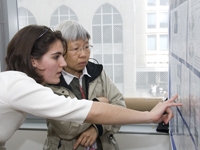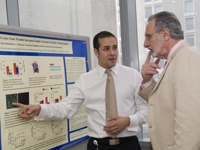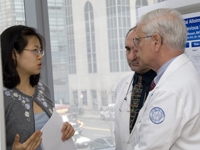Six months after creating an administrative office dedicated to supporting medical student research, Weill Cornell Medical College held its fifth annual Medical Student Research Day on March 14, the largest in its history with 65 submitted abstracts and 36 research presentations.
The success of the student-organized symposium, as well as the creation of the new Office of Medical Student Research, marks an increased emphasis on independent research experiences for medical students at Weill Cornell.

Class of 2010 student Anastasia Grivoyannis and Professor of Pharmacology Dr. Hazel Szeto.
"Real, independent student research is turning out to be increasingly important for graduates of progressive medical schools," said Dr. Joel Pardee, associate dean for research services and director of the Office of Medical Student Research.
"The transition from medical school to life requires not only training in your profession, but training in administering," said Dr. Pardee. "Students love to do it, and frankly, they're better at it than administrators because they bring a lot of energy to the symposium."
Planning for the 2007 Research Day was led by Aimee Angle-Zahn and Alex Pitts-Kiefer, both first-year, non-traditional students coming to Weill Cornell after careers in biomedical research, and included second-year medical students Connie Chen, Jonathan Chen and Ankit Patel.
"Often medical students go on to become not just physicians, but leaders in academic medicine, and this involves research, whether it is basic science or clinical research," said Angle-Zahn. "And this symposium is a celebration of our academic work and a start on our path toward becoming physicians."
Reflecting larger research trends in academic medicine—and in an effort to provide more opportunities for students—the College expanded definitions of research to include not only traditional work in basic and clinical sciences, but projects in clinical epidemiology, public and community health, and psychology, among others fields.
"We don't want to be exclusive, we wanted to be open to all students," said Pitts-Kiefer. "And we emphasized, particularly for first-year students, that projects didn't have to be related to science or clinical science—it could even be on the architecture of medical office buildings—as long as it was something related to the field of medicine."

First-year student Brian Rebolledo and Office of Medical Student Research Director Dr. Joel Pardee.
The Medical College also encourages students to pursue as many external research experiences as possible, which was reflected in the number of student projects with co-authors from institutions outside of Weill Cornell, including the University of Michigan, Harvard University/Massachusetts General Hospital, Duke University, among many others, including those closer to home like Mount Sinai Hospital and Memorial Sloan-Kettering Cancer Center.
"If a student finds someone through a different school or the NIH that they want to work with, we allow them to do research wherever they want to," said Dr. Pardee. "We would love to have them here, of course, and many do their research here."
Medical students at Weill Cornell have several opportunities for research experience and currently about half of medical students have some sort of independent research experience. They can join labs during the summer before medical school or between their first and second year (before summer class session sets in after the second year), and, ideally, "tag on" to those labs during the academic year, conducting research when they have time away from class commitments, Dr. Pardee said. The school also allows students to take a full year off to pursue research, and actively encourages students to apply for fellowships through institutions like the National Institutes of Health and the Howard Hughes Foundation.
During the afternoon on Research Day, 31 students presented posters as faculty and other students filtered through the Great Hall in the Weill Greenberg Center. Later in the afternoon, students with either completed or more advanced projects who expressed interest in delivering oral presentations discussed their work in the Weill Auditorium.
Eleven judges were culled from a list of 30 faculty members that the planning committee considered excellent educators in first- and second-year pre-clinical courses.

First-year student Crystal Hung discusses her study on fetal alloimmune thrombocytopenia with Dr. Michele Fuortes (center) and Dr. Marcus Reidenberg (right).
Dr. Laurie Glimcher presented the symposium's keynote address, the first in its five-year history. Dr. Glimcher, the Irene Heinz Given Professor of Immunology at the Harvard School of Public Health, spoke about her career investigating the molecular pathways that regulate CD4 T helper-cell development and activation, and specifically her lab's discovery of a transcription factor, XBP-1, that controls plasma cell differentiation and the unfolded protein response.
Although Dr. Glimcher said she admired Weill Cornell's program and its renewed push for student research, she said with strong students like those she had met while on campus, it's best to give them an opportunity and let them take it: "With students this good, you just let them go."
Judging by the increase in student presentations during this year's Research Day, it seems that many students have done just that. The 12 award winners from this year's competition received a cash prize and recognition in their Dean's Letter for their superb efforts.
2007 Medical Student Research Day Award Winners

First-year student Wesley Clark delivers an oral presentation in Weill Auditorium.
Sabina Bis
"Proton and Phosphorus Magnetic Resonance Spectroscopy in Parkinson's Disease: A Systematic Review"
Weill Cornell Medical College
Elan Bomsztyk
"Mobilization of VEGFR1+/CD34+ Hematopoietic Progenitor Cells and VEGFR2+/AC133+ Endothelial Progenitor Cells in Pediatric Rhabdomyosarcoma"
Weill Cornell Medical College
Connie Chen
"Effect of Age and Tumor Grade on BOLD fMRI in the Preoperative Assessment of Glioma Patients"
Memorial Sloan-Kettering Cancer Center
Sandra Demars
"Delayed Presentation After Burn Injury: A Clinical Problem?"
Weill Cornell Medical College
Dan Greninger
"The Use of FVIII/vWF Concentrate for Immune Tolerance Induction in Hemophilia-A Patients with High Titer Inhibitors: Correlation of Clinical Course with Inhibitor Epitope Profile"
Weill Cornell Medical College
Crystal Hung
"Management of Fetal Alloimmune Thrombocytopenia (AIT): Treatment of 30 Cases in Which the Previous Sibling Suffered an IntraCranial Hemorrhage (ICH)"
Weill Cornell Medical College
Eugene Licht
"Increasing Physical Activity in Type II Diabetes: The Pedometer Trial"
Weill Cornell Medical College
Brian Rebolledo
"Adenylyl Cyclase Gene Transfer Increases Function of the Failing Heart"
University of California, San Diego
Michelanne Rothrock
"Prospective Evaluation of the Impact of Diabetes upon Burn Injury:A Follow-up Report"
Weill Cornell Medical College
Shailen Sehgal
"Profound Induction of Apoptosis and Suppression of IL-1-Induced Production of Pro-Angiogenesis Cytokines by the Mitogenactivated Protein Kinase/Extracellular Signal Regulated Kinase (MEK) Inhibitor UO126 in Cultured Thoracic Cancer Cells"
National Institutes of Health, National Cancer Institute
Anna Taylor-Shih
"Prolonged separation among Chinese immigrant families in NYC: Perceptions & Challenges"
Charles B. Wang Community Health Center
Kristin Taylor
"Apolipoprotein E and Brain Development in Healthy Children"
National Institutes of Health
Photography by Amelia Panico.

